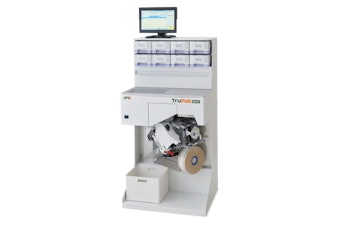Blister packs have long been touted for their ability to help with patient compliance, but a recent study showed that by using the packaging, patients also received a health benefit. Conducted from March '02 through December '04, the study was done by Ohio State University and the Centers for Medicare and Medicaid Services, who provided financial support.
The study "showed fundamentally that the principle of repackaging medicines is way more effective than loose tablets," says the study's author, Philip J. Schneider, M.S., clinical professor and director at the Columbus, OH, university's College of Pharmacy. The study involved 88 seniors with hypertension. Of these 88, 48 were randomly selected to receive lisinopril (Prinivil is its brand name) in blister packs. Cardinal Health, Inc. supplied the materials and did the packaging. Forty patients received the same medication filled loosely into traditional bottles.
Schneider says that not only did a blister-packed 28-day supply of Merck's hypertension medication improve drug regimen compliance in the randomly selected patients who used the blister pack, "but it also lowered the diastolic blood pressures of 48 percent of those patients." Conversely, only 18% of the 40 seniors who took the drug in a traditional bottle showed a decrease in their diastolic blood pressures.
"The major summary is that there is now data that a package can assist not only in patient compliance, but that there is also an outcomes benefit," states Renard Jackson, executive VP for sales and business development of Cardinal Health's Packaging Services Group.
"It's extremely important," says Ohio State's Schneider, to understand that "this study was a government-funded, independent study done at a university.
"The goal of the study was to look at an alternative method of packaging medications for chronic illness, on compliance to treatment regimens in elderly patients," Schneider notes. He said, "Compliance was a key issue, but so was therapeutic outcome. We specifically chose a single condition, hypertension, because we can measure a patient's blood pressure."
"We found that 66 percent of patients who had medicines filled loosely in bottles had their prescriptions filled on time," he says, "which is within plus-or-minus five days from the 28-day refill time. The number increased to 80% for patients with the blister pack. "That's considered statistically significant," says Schneider.
For more information, e-mail Philip Schneider at [email protected] or visit http://researchnews.osu.edu.
--By Jim Butschli, Editor
The study "showed fundamentally that the principle of repackaging medicines is way more effective than loose tablets," says the study's author, Philip J. Schneider, M.S., clinical professor and director at the Columbus, OH, university's College of Pharmacy. The study involved 88 seniors with hypertension. Of these 88, 48 were randomly selected to receive lisinopril (Prinivil is its brand name) in blister packs. Cardinal Health, Inc. supplied the materials and did the packaging. Forty patients received the same medication filled loosely into traditional bottles.
Schneider says that not only did a blister-packed 28-day supply of Merck's hypertension medication improve drug regimen compliance in the randomly selected patients who used the blister pack, "but it also lowered the diastolic blood pressures of 48 percent of those patients." Conversely, only 18% of the 40 seniors who took the drug in a traditional bottle showed a decrease in their diastolic blood pressures.
"The major summary is that there is now data that a package can assist not only in patient compliance, but that there is also an outcomes benefit," states Renard Jackson, executive VP for sales and business development of Cardinal Health's Packaging Services Group.
"It's extremely important," says Ohio State's Schneider, to understand that "this study was a government-funded, independent study done at a university.
"The goal of the study was to look at an alternative method of packaging medications for chronic illness, on compliance to treatment regimens in elderly patients," Schneider notes. He said, "Compliance was a key issue, but so was therapeutic outcome. We specifically chose a single condition, hypertension, because we can measure a patient's blood pressure."
"We found that 66 percent of patients who had medicines filled loosely in bottles had their prescriptions filled on time," he says, "which is within plus-or-minus five days from the 28-day refill time. The number increased to 80% for patients with the blister pack. "That's considered statistically significant," says Schneider.
For more information, e-mail Philip Schneider at [email protected] or visit http://researchnews.osu.edu.
--By Jim Butschli, Editor


















